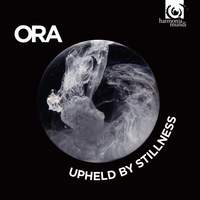Recording of the Week,
ORA performs choral music inspired by William Byrd
To make an impact on the London choral scene these days, any new vocal ensemble needs a unique selling-point in terms of repertoire and – let’s be honest – a great launch-party; Suzi Digby’s new ‘super-choir’ ORA (so-named for its founder’s conviction in a contemporary ‘second Golden Age’ of choral music) fulfilled both criteria on Tuesday night, when Chris and I paid an after-hours visit to The Tower of London to hear excerpts from Upheld by Stillness, their debut recording, and the beginning of a partnership with Harmonia Mundi which will see a projected 100 newly-commissioned works inspired by some of the jewels in the crown of the Renaissance choral repertoire.

The Chapel of St Peter ad Vincula provided not just a dramatic setting but also an uncannily appropriate one for this inaugural volume, based as it is around the music of the religiously conflicted Tudor composer William Byrd: the Chapel bears witness to the ‘bloody days’ of the English Reformation, housing the remains of the Catholic martyrs Thomas More and John Fisher as well as those of their Protestant nemesis Anne Boleyn (whose daughter Elizabeth would see the first ‘Golden Age’ of English choral music during her fifty-year reign).
Byrd’s great Mass for Five Voices provides the impetus for five of the six new commissions here, and it’s given complete and in sequence on the recording in a well-balanced and lovingly shaped performance of superb clarity which reveals every inner detail that the contemporary composers later take up and develop in their homages. (Rather than presenting the Mass in a stand-alone performance, the concert itself juxtaposed selected movements with the new works which they inspired, which I thought worked rather well; you might like to experiment with reprogramming the playing-order on the disc to replicate this effect).
The composers’ responses to Byrd vary from the relatively direct (Roxanna Panufnik’s luminous Kyrie, which takes the opening soprano phrase from Byrd’s original and leads it through a series of chromatic sea-changes which are appropriately rich and strange) to the rather more elliptical, such as Owain Park’s setting of a poem by Kathleen Raine (from which the disc takes its title) to music in which the ‘shapes and contours’ of Byrd’s Sanctus and Benedictus are offset against a harmonic background that’s unmistakeably twenty-first century. Roderick Williams’s ‘re-imagining’ of the motet Ave verum corpus radiates huge affection for the original (cultivated during the composer-singer’s years as a treble and later baritone chorister), replicating that familiar process by which favourite moments and phrases of a work become a sort of welcome ‘ear-worm’ that plays on mental loop, fragmented and transmogrified, after repeated exposure!
But for me it was Alexander L’Estrange’s Show me, deare Christ that made the biggest impact of the evening: certainly the most ambitious in terms of its frame of reference and sheer scale, it uses gobbets from texts by John Donne and the Jesuit martyrs Robert Southwell and Edmund Campion, interwoven with quotations from the Athanasian Creed in both Latin and English to create an alternative set of ‘five voices’ within a work which stands out as the programme’s most explicit confrontation of the spiritual confusion and tangible dangers facing Byrd and his contemporaries.
With six commissions down on this disc and a projected 94 to go, Digby and her singers certainly aren’t letting the grass grow and the evening ended with a tantalising glimpse of what’s to come on their next recording (already in the can, with a third about to go into the studio as I write this): a blazing large-scale homage not to Byrd but to Allegri (whose Miserere, in a new edition by Ben Byram-Wigfield, had opened the concert), instantly recognisable as the work of James Macmillan and a transcendent coda to the evening. Enjoy Volume One, and await its successor with bated breath.
... And if you're curious to find out more about ORA, then get the inside story on the thinking behind the project - David spoke to Suzi earlier this week and asked her about where the impetus came from and what her vision is for this new initiative.
ORA, Suzi Digby
Available Formats: MP3, FLAC, Hi-Res FLAC



